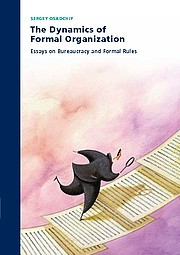The Dynamics of Formal Organization: Essays on Bureaucracy and Formal Rules Defended on Friday, 6 May 2011
Theories of bureaucracy in organization studies constitute a perspective in which formal or written rules are seen as fundamental to the understanding of organization. It is argued, for example, that formal rules facilitate organizational decision-making, establish the basis for coordination and control, and help to increase an organization’s legitimacy within the broader institutional environment. Like other elements of organizations, rules also change over time with potential consequences for decision-making, coordination, and legitimacy. This dissertation takes up questions about the causes of continuity and change of formal organizational rules, as well as of bureaucratic organizational forms more broadly. The first conceptual essay (Chapter 2) starts with the observation that bureaucracy is a remarkably persistent organizational form and suggests that the reproduction or transformation of this form and its prevalence in various organizational fields depends on the agency and interaction of different expert groups. In Chapter 3, we present a conceptual account of the dynamic process of codification and enforcement of formal rules and its influence on the preservation and retrieval of organizational memory via these rules. In Chapter 4, we offer a conceptual account of how the process of using existing formal rules to deal with new organizational problems can ultimately lead to change in such rules. Finally, Chapter 5 reports the results of a longitudinal empirical study of rule changes in UNESCO’s World Heritage Program. We find that that rule makers’ cultural heterogeneity tends to delay rule changes, while rule makers’ normative power tends to accelerate them.
Keywords
bureaucracy, rules, formalization, organizations, organizational change, persistence, institutions, social actors, expert groups, organizational memory, organizational learning, power











